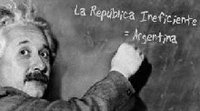[Capítulo III: Entendiendo la República Ineficiente] La deuda pública. Economía para todos
[http://www.economiaparatodos.com.ar/ver_nota.php?nota=117]
“...Será preciso que los gobiernos argentinos sean muy ciegos
para que desconozcan, que faltar a sus deberes en el pago
de los intereses de la deuda, es lo mismo que envenenar
el único pan de su alimento y suicidarse: es algo más desastroso
que faltar al honor, es condenarse a la bancarrota y al hambre”
Juan Bautista Alberdi, Sistema Económico y Rentístico
de la Confederación Argentina según su Constitución de 1853,
Edición Escuela de Educación Económica, pág. 155
Economí para todos
...no en vano leemos artículos como los de David DeRosa....
Default Is Way of Life in Argentina: David DeRosa
"...The issue is tricky because federal and provincial finances are interwoven. Putting Argentina on a sound financial footing requires federal and provincial governments to operate in a financially sound manner. In other words, one could plug the leak at the federal level only to have the provincial governments take on massive water..."
"...Tough Luck, Hombre
The bondholders are striking back. The largest group, the Global Committee of Argentina Bondholders, has resorted to giving presentations in the U.S., Europe and Asia as to why Argentina can afford to improve the offer of settlement.
The bondholders at least have a chance of getting some money back -- that's more than can be said of Argentines themselves who had the misfortune of having money in local banks at default time.
The Argentine Supreme Court ruled Tuesday that depositors who ``voluntarily'' accepted the government-sponsored offer to convert dollar deposits to pesos at the rate of 1.40 to the dollar have no legal recourse.
The court should be ashamed of itself.
Involuntary `Pesification'
The ``pesification'' was anything but voluntary. Prior to the government's offer, savings accounts were frozen. When the offer was made, ordinary savers saw this as a take-it-or-leave-it chance to get their money out of the rapidly collapsing banks.
Moreover, the exchange rate of a dollar for 1.40 pesos was grossly unfair to the depositors, a rate that was nothing more than a figment of the government's imagination. The average 2002 peso exchange rate was 3.14 pesos to the dollar.
Maybe there should be a new committee for all the people who have suffered from owning Argentine sovereign debt, provincial debt, or from having money in Argentine banks. The problem is that there isn't a stadium large enough to hold a meeting..."
Bloomberg Printer-Friendly Page:
--
Posted by Alberdi & Urquiza to Capítulo III: Entendiendo la República Ineficiente at 7/15/2004 05:13:00 PM
“...Será preciso que los gobiernos argentinos sean muy ciegos
para que desconozcan, que faltar a sus deberes en el pago
de los intereses de la deuda, es lo mismo que envenenar
el único pan de su alimento y suicidarse: es algo más desastroso
que faltar al honor, es condenarse a la bancarrota y al hambre”
Juan Bautista Alberdi, Sistema Económico y Rentístico
de la Confederación Argentina según su Constitución de 1853,
Edición Escuela de Educación Económica, pág. 155
Economí para todos
...no en vano leemos artículos como los de David DeRosa....
Default Is Way of Life in Argentina: David DeRosa
"...The issue is tricky because federal and provincial finances are interwoven. Putting Argentina on a sound financial footing requires federal and provincial governments to operate in a financially sound manner. In other words, one could plug the leak at the federal level only to have the provincial governments take on massive water..."
"...Tough Luck, Hombre
The bondholders are striking back. The largest group, the Global Committee of Argentina Bondholders, has resorted to giving presentations in the U.S., Europe and Asia as to why Argentina can afford to improve the offer of settlement.
The bondholders at least have a chance of getting some money back -- that's more than can be said of Argentines themselves who had the misfortune of having money in local banks at default time.
The Argentine Supreme Court ruled Tuesday that depositors who ``voluntarily'' accepted the government-sponsored offer to convert dollar deposits to pesos at the rate of 1.40 to the dollar have no legal recourse.
The court should be ashamed of itself.
Involuntary `Pesification'
The ``pesification'' was anything but voluntary. Prior to the government's offer, savings accounts were frozen. When the offer was made, ordinary savers saw this as a take-it-or-leave-it chance to get their money out of the rapidly collapsing banks.
Moreover, the exchange rate of a dollar for 1.40 pesos was grossly unfair to the depositors, a rate that was nothing more than a figment of the government's imagination. The average 2002 peso exchange rate was 3.14 pesos to the dollar.
Maybe there should be a new committee for all the people who have suffered from owning Argentine sovereign debt, provincial debt, or from having money in Argentine banks. The problem is that there isn't a stadium large enough to hold a meeting..."
Bloomberg Printer-Friendly Page:
--
Posted by Alberdi & Urquiza to Capítulo III: Entendiendo la República Ineficiente at 7/15/2004 05:13:00 PM













<< Home